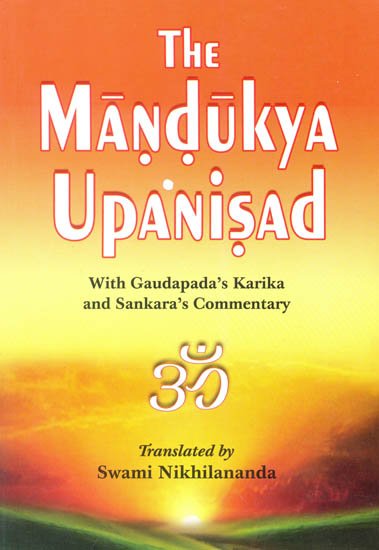Mandukya Upanishad (Gaudapa Karika and Shankara Bhashya)
by Swami Nikhilananda | 1949 | 115,575 words | ISBN-13: 9788175050228
This is verse 4.29 of the Mandukya Karika English translation, including commentaries by Gaudapada (Karika), Shankara (Bhashya) and a glossary by Anandagiri (Tika). Alternate transliteration: Māṇḍūkya-upaniṣad 4.29, Gauḍapāda Kārikā, Śaṅkara Bhāṣya, Ānandagiri Ṭīkā.
Mandukya Karika, verse 4.29
Sanskrit text, IAST transliteration and English translation
अजातं जायते यस्मात् अजातिः प्रकृतिस्ततः ।
प्रकृतेरन्यथाभावो न कथंचिद्भविष्यति ॥ २९ ॥ajātaṃ jāyate yasmāt ajātiḥ prakṛtistataḥ |
prakṛteranyathābhāvo na kathaṃcidbhaviṣyati || 29 ||29. (In the opinion of the disputants) that which is unborn is said to be born. For, its very nature is to be ever unborn. It is never possible for a thing to be other than what it is.
Shankara Bhashya (commentary)
For reasons already stated it is established that Brahman is one and unborn. This verse summarises, the conclusion of what has already been stated in the form of proposition. The unborn mind, which1 is verily Brahman, is imagined by the disputants to be born. Therefore (according to them) the ever-unborn is said to be born. For, it is unborn by its very nature. It2 is simply impossible for a thing, which is ever unborn by nature, to be anyhow born, that is to say, to be anyhow otherwise than what it is.
Anandagiri Tika (glossary)
1 Which, etc.—It has been already seen that the mind is never born. Therefore the mind is Brahman, non-dual and immutable. The disputants, on account of ignorance, see the modifications and change in the mind. The very nature of the mind is that it is one and without a second, and free from change or birth.
2 It is, etc.—The absolute mind does not in any way undergo any change. Even through delusion the mind cannot be said to pass into birth. If it were so then it cannot be said to be unborn and unchanging in nature.
